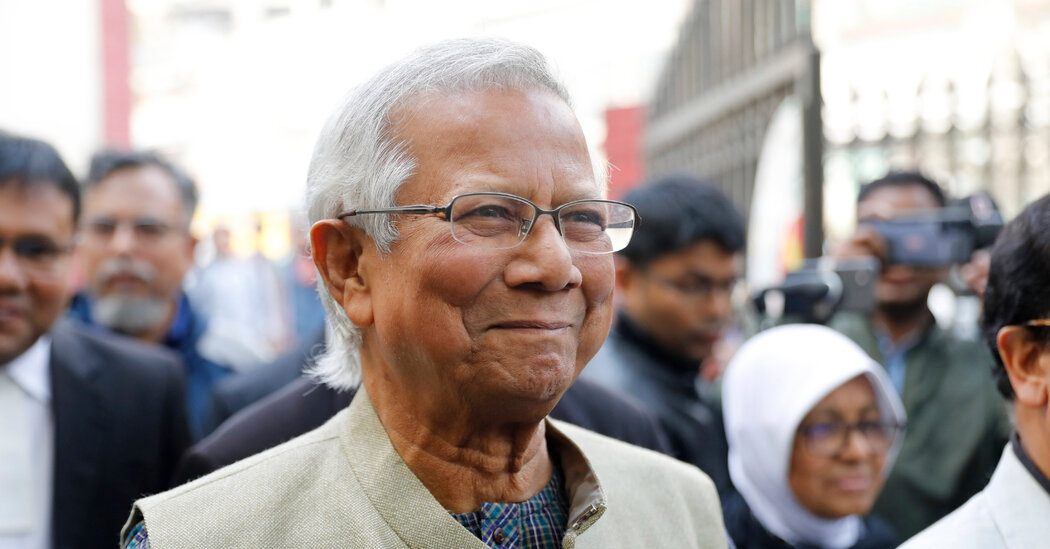World
Bangladesh Appoints Muhammad Yunus as Interim Government Leader Amid Protests
In a surprising move, Bangladesh appoints Nobel laureate Muhammad Yunus as the interim government leader amidst escalating protests. Explore the implications of this decision on the political landscape and the response from citizens.

The president of Bangladesh has appointed Muhammad Yunus, a pioneering figure in microfinance and a Nobel laureate, to lead an interim government. This decision comes in response to widespread protests and demands from citizens seeking change, providing a much-needed respite for a nation grappling with turmoil and violence.
The announcement was made by Nahid Islam, the main coordinator of the protests, just a day after the country’s authoritarian leader, Sheikh Hasina, resigned and fled in the face of a popular uprising. Mr. Islam was part of a delegation that included military officials during a meeting with the president on Tuesday.
At 84 years old, Mr. Yunus is tasked with overseeing a temporary government following the dissolution of the Bangladeshi Parliament. His appointment is seen as a hopeful turn for the country, which has been shaken by weeks of unrest and violent confrontations, resulting in the deaths of over 100 individuals.
Mr. Yunus faces two critical immediate challenges:
- Restoring Order: He must bring stability to a nation of 170 million people that has been disrupted by intense student-led protests and violent clashes with security forces.
- Defining Governance: He will need to articulate the role and mandate of the interim government as Bangladesh prepares for new elections to establish a new leadership.
In the days leading up to Ms. Hasina’s resignation, demonstrators had been vocally demanding her ouster, infuriated by the government’s severe crackdown on students protesting against a biased quota system for public-sector job recruitment.
According to Fahmida Khatun, head of research at the Center for Policy Dialogue, restoring peace and addressing the rampant violence will be paramount for the interim government. “As observed, there is chaos on the streets, a pervasive distrust in the police, and significant property destruction,” Ms. Khatun remarked.
Smriti Singh, regional director for South Asia at Amnesty International, emphasized the opportunity for the new interim government to resonate with the populace. “This is a critical moment for any incoming administration in Bangladesh to stand in solidarity with its citizens, safeguard vulnerable communities, and avoid repeating historical errors,” she stated.
With the urgency of the situation in mind, Mr. Yunus will likely need to act swiftly to appoint capable individuals to stabilize the various ministries, ensuring that the economy of Bangladesh does not suffer further setbacks.
Mr. Yunus is renowned for his groundbreaking work in microfinance, a concept he developed to provide loans to individuals too impoverished to access traditional banking services, enabling them to pursue economic opportunities. In recognition of his contributions, he was awarded the Nobel Peace Prize in 2006.
In 2007, during a period when Bangladesh was governed by a military-backed interim administration, Mr. Yunus ventured into politics by founding a political party that aimed to offer a viable alternative to the corrupt political landscape. However, this political endeavor was short-lived, and he eventually withdrew from the political arena. His political aspirations, however, did not come without consequences; he had alienated influential figures, including Ms. Hasina, as analysts have noted.
As Bangladesh stands on the precipice of change, the nation looks towards Mr. Yunus for leadership in these tumultuous times, hoping for a brighter future ahead.
Qasim Nauman contributed reporting.
World
Dominique Pelicot Testifies in Harrowing Rape Trial
Join us as Dominique Pelicot courageously testifies in a harrowing rape trial, shedding light on the complexities of trauma and justice. Her powerful story raises crucial questions about the legal system and the importance of support for survivors.

Dominique Pelicot Takes the Stand in Shocking Rape Trial
In a courtroom drama that has captivated France and garnered international attention, Dominique Pelicot, the man at the center of a harrowing rape trial, finally addressed the court. With tears streaming down his face, he recounted how his wife had been instrumental in helping him cope with a tumultuous past marked by trauma. He revealed that he had endured a sexual assault at the tender age of nine while hospitalized, and he also witnessed a gang rape during his teenage years while working as an apprentice electrician on a construction site.
“She didn’t deserve this, I acknowledge that,” Mr. Pelicot stated, his voice barely audible as he struggled to convey his emotions. The gravity of the situation weighed heavily on him, and the courtroom fell silent, straining to catch his every word.
Now 71 years old, Mr. Pelicot faces serious allegations of drugging his wife, Gisèle Pelicot, whom he has been married to for half a century, over a span of nearly ten years. Prosecutors contend that he used drugs to render her comatose, allowing him to rape her repeatedly. Furthermore, authorities allege that he went so far as to invite numerous men into their home, facilitating a nightmarish scenario where they, too, engaged in the assault of his wife.
Overall, 51 men, including Mr. Pelicot, are on trial concurrently, primarily facing charges related to the aggravated rape of Ms. Pelicot. Among them, one individual has already pleaded guilty to similar crimes, admitting to drugging his own wife to assault her and inviting Mr. Pelicot to partake in the horrific act while she was incapacitated.
Mr. Pelicot’s unexpected testimony came after a tumultuous start to the trial. Just a week in, he was stricken with severe health issues that forced him to miss four consecutive days in court. The head judge ultimately decided to postpone proceedings, as Mr. Pelicot was diagnosed with kidney stones, a kidney infection, and prostate complications, adding yet another layer of complexity to this already harrowing case.
World
Meta Bans Russian State Media Outlets from Social Media Platforms
Explore the implications of Meta’s decision to ban Russian state media outlets from its social media platforms. Understand the impact on information dissemination and the ongoing battle against misinformation in the digital landscape.

Meta Imposes Global Ban on Russian State Media Outlets
In a significant move, Meta Platforms, Inc., the parent company of Facebook, has announced the prohibition of Russian state media outlets, including RT (Russia Today) and Rossiya Segodnya, from all its social media platforms. The decision stems from the company’s concerns regarding the deceptive strategies employed by these media organizations to execute covert influence operations across the internet.
Meta made this announcement on Monday, emphasizing that the ban will be enforced worldwide across its various platforms, such as Instagram, WhatsApp, and Threads. The rollout of this ban is expected to take place over the coming days.
Statement from Meta
A spokesperson for Meta elaborated on the decision, stating, “After careful consideration, we have expanded our ongoing enforcement actions against Russian state media outlets. As a result, Rossiya Segodnya, RT, and other affiliated entities are now banned from our applications globally due to their involvement in foreign interference activities.”
For further insights into this development, watch the video in the player above.
World
Trump Recalls Alleged Assassination Attempt While Golfing
Explore Donald Trump’s chilling recollection of an alleged assassination attempt he experienced while enjoying a round of golf. Delve into the tense moments and his reflections on safety, fame, and the unpredictability of public life.

In a recent interview on the social media platform X, Republican presidential nominee Donald Trump recounted a harrowing incident he claims to have experienced while playing golf. Trump described how, during a peaceful Sunday morning round with friends, the tranquility of the day was abruptly shattered by the sound of gunfire in the air.
“It was a beautiful day, everything was just perfect,” Trump reflected. “Then all of a sudden, we heard shots being fired—probably around four or five in total.” He went on to explain that a Secret Service agent was the first to spot the suspect, who was allegedly armed with an AK-47, a powerful assault rifle.
“The agent saw the barrel of the weapon and immediately took action, returning fire at the barrel and aiming in the direction of the bushes,” Trump detailed. “I would have loved to have sunk that last putt, but we decided it was best to leave the scene promptly.”
Trump expressed his gratitude towards the agents and a vigilant civilian who aided in tracking down the suspect, who was eventually apprehended following a high-speed chase.
Suspect Faces Multiple Federal Gun Charges
The FBI has identified the suspect as Ryan Wesley Routh, accusing him of targeting Trump during his time at the golf club in West Palm Beach, Florida. According to an FBI report, Routh had allegedly hidden among the hedges of the golf course for an astonishing 12 hours. Authorities discovered an SKS-style assault rifle, a GoPro camera, and a bag of food at the scene.
The 58-year-old Routh is now facing two serious federal gun charges. If convicted on both counts, he could face a combined maximum sentence of 20 years in prison. Notably, neither of the charges is directly related to an assassination attempt. The first charge pertains to possessing a firearm despite a prior felony conviction, which carries a potential 15-year sentence, a fine of $250,000 (€225,000), and three years of supervised release.
The second charge involves possession of a firearm with an obliterated serial number, which could result in a five-year prison term, the same financial penalties, and also three years of supervised release. As the investigation continues, additional charges could be forthcoming.
While the motive behind Routh’s actions remains unclear, his digital footprint reveals strong political affiliations, particularly concerning issues surrounding Ukraine and China. Routh consistently expressed support for Ukraine across various social media platforms, even claiming to have orchestrated a recruitment scheme for international volunteers aiming to assist Ukraine in its fight against Russia’s invasion. This behavior has been denounced by Ukrainian soldiers and members of the International Legion, who disavowed Routh’s actions and motives.
-

 Business4 months ago
Business4 months agoThe Significance of Jackson Hole: A Central Banking Tradition
-

 Business5 months ago
Business5 months agoObituary: Dan Collins
-

 Tech3 months ago
Tech3 months agoNew Leaks and Features About the Samsung Galaxy S25 Ultra
-

 Article6 months ago
Article6 months agoCreative Design Applications Developed with Artificial Intelligence
-

 Gaming6 months ago
Gaming6 months agoMore than a thousand students vowed not to work for Amazon and Google due to the Nimbus Project.
-

 Business3 months ago
Business3 months agoBhutan’s Strategic Investment in Bitcoin: A New Era for the Himalayan Kingdom
-

 World6 months ago
World6 months agoRussia and North Korea Strengthen Defense Ties
-

 World4 months ago
World4 months agoLa Transformación Política en Tailandia: Desafíos y Nuevas Direcciones












